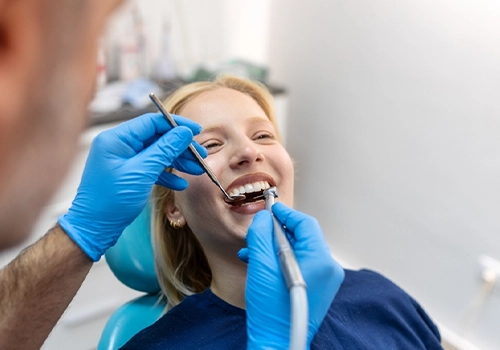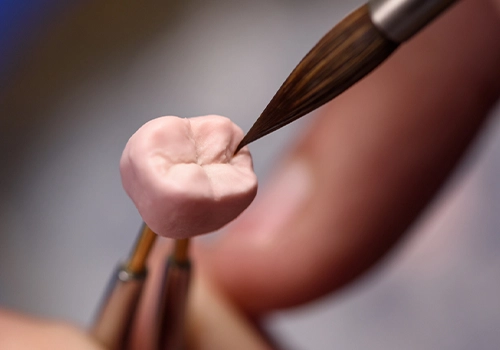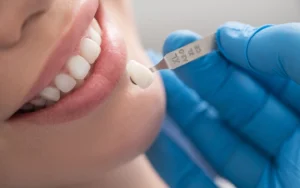Dental Crowns; Types, Advantages, and Aftercare Tips
When it comes to improving the strength, functionality, and appearance of teeth that have been damaged, dental crowns are a flexible option and Dr. Maadico’s Medical Department is a great center for dental crown procedures in Iran.
Dr. Maadico’s Medical Department offers comprehensive services, skilled dental specialists, and modern technology, making it a dependable option for high-quality dental care. We will delve into the details of dental crowns in this extensive tutorial, covering their types, benefits, aftercare, dangers, and preparation procedures.
What Are Dental Crowns?
Dental crowns are custom-made caps designed to encase damaged or weakened teeth in restorative dentistry. They restore the tooth’s original shape and size, reinforcing its strength. They also enhance the tooth’s appearance, providing a robust shield that protects it from further damage and provides essential support. Their significance extends beyond functionality to aesthetics.
When placing a dental crown, a dentist must first evaluate the weakness and damage to the tooth before creating a crown that blends in with the surrounding tissue. Crowns provide as a barrier against damage and external pressure by covering the whole visible surface. They are an essential component of restorative dentistry, striking a balance between structural restoration and cosmetic augmentation.
Types of Dental Crowns
We talk about the many kinds of dental crowns and how they may be customized to meet the specific requirements of those looking for both cosmetic and restorative dental solutions. Explore the variety of choices that redefine smiles, from the strength of metal to the grace of porcelain.
- Porcelain Crowns
Because they resemble the color and translucency of genuine teeth, porcelain crowns are attractive because of their lifelike appearance. Their flawless fit with the neighboring teeth makes them a great option for front tooth repair.
- Metal Crowns
Metal crowns are known for their longevity and are frequently composed of alloys like silver or gold. They are a strong alternative, especially for molars (molar teeth) where strength is essential, even though they might not blend in with the natural color of teeth.
- Porcelain-Fused-to-Metal (PFM) Crowns
PFM crowns blend the beauty of porcelain with the strength of metal. These crowns are adaptable, good for both anterior and posterior teeth, and provide a good compromise between longevity and aesthetic appeal.
- Ceramic Crowns
For those who are allergic to metals, ceramic crowns are the best option due to their well-known biocompatibility and attractive appearance. They offer a harmonic and allergy-conscious dental solution, taking into account the various demands of their patients while maintaining a natural-looking finish.

Advantages of Dental Crowns
Because of its many advantages, dental crowns are a recommended treatment option for a variety of dental problems. Let’s examine a few of the benefits:
- Restoration of Tooth Structure
In restorative dentistry, dental crowns are crucial for repairing broken teeth and serving as a barrier to stop additional damage. Teeth that are weak or damaged are protected by specially-made caps that offer strength and stability. They protect teeth from outside influences that can exacerbate their condition. Examine the many kinds of dental crowns and how they might improve oral health.
- Enhanced Aesthetics
Dental crowns, which are composed of porcelain and ceramic materials, provide a flexible and individualized way to mimic the color and shape of real teeth. This guarantees an exact aesthetic match and aesthetically pleasing outcome, improving the patient’s smile and stretching the limits of what is considered beautiful in dentistry.
- Improved Functionality
By strengthening weak or broken teeth, restoring structural integrity, and permitting normal chewing and biting, dental crowns improve the strength and functionality of teeth. This revolutionary intervention combines strength and functionality to guarantee optimal dental health.
- Long-lasting Solution
When taken care of appropriately, dental crowns provide a dependable, long-term tooth restoration option. They endure the test of time with appropriate care and routine maintenance, giving patients enduring trust in their repaired teeth and a reliable option for long-term dental health.
Who is a Good Candidate for Dental Crown?
Dental crowns might not be a good fit for everyone. It is important to comprehend this procedure’s suitability. Possible candidates consist of:
- People whose teeth are broken or cracked
- those whose extreme dental rot is too severe for a filling
- People who have had a root canal and need more protection for the tooth that was treated
- Individuals who have aesthetic difficulties, such as excessively stained or uneven teeth
Risks Associated with Dental Crowns
Even though dental crowns are usually safe, it’s important to be aware of any possible dangers and issues. A few of these consist of:
- Allergic Reactions: Rarely, people may develop sensitivities to the materials—particularly the metal alloys—used in crowns.
- Tooth Sensitivity: It is possible to become sensitive to hot or cold conditions, especially after the crown has been placed.

- Discomfort or Pain: Some people could feel pain or discomfort, particularly if the crown fits incorrectly.
It’s critical to keep lines of communication open with your dentist in order to ensure that any problems or strange symptoms are quickly identified and resolved. Prompt communication facilitates a cooperative approach to dental health by encouraging preventative treatment and addressing possible problems before they become more serious.
Dental Crowns Procedure
This guide delves into the dental crowns procedure, a crucial step in dental wellness. It details the process, its steps, types, benefits, risks, and aftercare.
The procedure is designed to restore damaged teeth and enhance their strength, functionality, and aesthetic appeal. It can be used to address structural issues or improve the visual appeal of a smile. Join us in understanding the art and science behind this transformative dental procedure.
- Preparation
Your dentist will remove any decay from the afflicted tooth and shape it to fit the crown before placing the crown. To guarantee a precise fit for the crown, an impression of the tooth is then obtained.
- Crown Replacement
A crown replacement could be advised if your current crown is broken or no longer fits correctly. This entails taking off the outdated crown and making and putting in a fresh one.
- Crown Restoration
When there is significant decay or damage to a tooth, crown repair becomes a possibility. Through the use of a custom-made crown, the tooth is completely restored in this process, regaining both shape and function.
Aftercare for Dental Crowns
For dental crowns to last a long time and be effective, proper upkeep is necessary. Here are some rules to follow:
- Maintain Good Oral Hygiene: To avoid plaque accumulation and to keep the gums and teeth around them healthy, brush and floss on a regular basis.
- Chewing on Hard items: To avoid damaging the crown, avoid biting down on hard items like ice or pencils.
- Frequent Dental Check-ups: Make an appointment for routine dental check-ups to keep an eye on the crown’s condition and to quickly address any problems.

Conclusion
Dental crowns are a modern dentistry solution that can be used to restore damaged teeth or improve smile aesthetics. They offer a customizable and effective option. Understanding their types, advantages, risks, and aftercare helps individuals make informed decisions about their oral health.
For those considering dental crowns, reputable services like Dr. Maadico’s Medical Department in Iran are recommended. Consult with our dentists and consider these options for a comprehensive and informed approach to dental crown needs.
Get a Free Consultation
FAQ
- How long do dental crowns last?
On average, dental crowns have a lifespan of 10 to 15 years; however, this might vary depending on many factors like oral cleanliness, material deterioration, and use.
- What are the three types of crowns?
The three main types of dental crowns are porcelain, metal, and porcelain-fused-to-metal (PFM).
- Are there any restrictions after getting a crown?
There aren’t usually any major restrictions after receiving a crown; just be careful not to chew on harsh items and practice good dental hygiene.
- Why consider Iran as a destination for dental crowns?
The initial factor is the presence of skilled dentists in Iran, guaranteeing the safe execution of both medical and cosmetic dental procedures. The second factor is the lower cost of dental treatments in Iran compared to other European countries, without any compromise on quality.
Dental crowns can be expensive due to materials and labor. Consider exploring options in countries like Iran, with centers like Dr.Maadico, for competitive prices.


